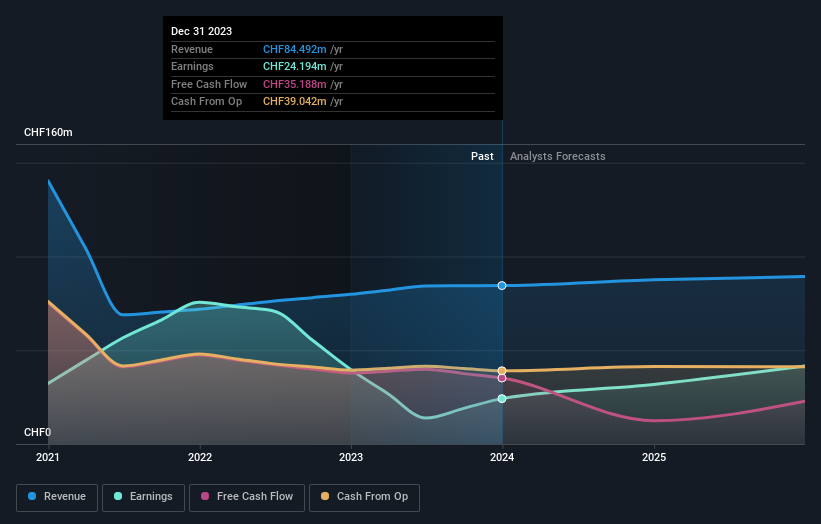Insiders own 20% of Zug Estates Holding AG (VTX:ZUGN) shares but individual investors control 53% of the company
Key Insights
The considerable ownership by individual investors in Zug Estates Holding indicates that they collectively have a greater say in management and business strategy
46% of the business is held by the top 25 shareholders
If you want to know who really controls Zug Estates Holding AG (VTX:ZUGN), then you'll have to look at the makeup of its share registry. And the group that holds the biggest piece of the pie are individual investors with 53% ownership. Put another way, the group faces the maximum upside potential (or downside risk).
Individual insiders, on the other hand, account for 20% of the company's stockholders. Institutions often own shares in more established companies, while it's not unusual to see insiders own a fair bit of smaller companies.
In the chart below, we zoom in on the different ownership groups of Zug Estates Holding.
Check out our latest analysis for Zug Estates Holding
What Does The Institutional Ownership Tell Us About Zug Estates Holding?
Institutional investors commonly compare their own returns to the returns of a commonly followed index. So they generally do consider buying larger companies that are included in the relevant benchmark index.
As you can see, institutional investors have a fair amount of stake in Zug Estates Holding. This can indicate that the company has a certain degree of credibility in the investment community. However, it is best to be wary of relying on the supposed validation that comes with institutional investors. They too, get it wrong sometimes. It is not uncommon to see a big share price drop if two large institutional investors try to sell out of a stock at the same time. So it is worth checking the past earnings trajectory of Zug Estates Holding, (below). Of course, keep in mind that there are other factors to consider, too.
Hedge funds don't have many shares in Zug Estates Holding. The company's largest shareholder is Wemaco Invest AG, with ownership of 12%. For context, the second largest shareholder holds about 11% of the shares outstanding, followed by an ownership of 7.0% by the third-largest shareholder. Annelies Buhofer, who is the third-largest shareholder, also happens to hold the title of Member of the Board of Directors.
Our studies suggest that the top 25 shareholders collectively control less than half of the company's shares, meaning that the company's shares are widely disseminated and there is no dominant shareholder.
While studying institutional ownership for a company can add value to your research, it is also a good practice to research analyst recommendations to get a deeper understand of a stock's expected performance. While there is some analyst coverage, the company is probably not widely covered. So it could gain more attention, down the track.
Insider Ownership Of Zug Estates Holding
The definition of an insider can differ slightly between different countries, but members of the board of directors always count. Company management run the business, but the CEO will answer to the board, even if he or she is a member of it.
Most consider insider ownership a positive because it can indicate the board is well aligned with other shareholders. However, on some occasions too much power is concentrated within this group.
Our information suggests that insiders maintain a significant holding in Zug Estates Holding AG. Insiders own CHF179m worth of shares in the CHF895m company. We would say this shows alignment with shareholders, but it is worth noting that the company is still quite small; some insiders may have founded the business. You can click here to see if those insiders have been buying or selling.
General Public Ownership
The general public -- including retail investors -- own 53% of Zug Estates Holding. This size of ownership gives investors from the general public some collective power. They can and probably do influence decisions on executive compensation, dividend policies and proposed business acquisitions.
Private Company Ownership
Our data indicates that Private Companies hold 12%, of the company's shares. It might be worth looking deeper into this. If related parties, such as insiders, have an interest in one of these private companies, that should be disclosed in the annual report. Private companies may also have a strategic interest in the company.
Next Steps:
I find it very interesting to look at who exactly owns a company. But to truly gain insight, we need to consider other information, too. Be aware that Zug Estates Holding is showing 4 warning signs in our investment analysis , and 1 of those is concerning...
But ultimately it is the future, not the past, that will determine how well the owners of this business will do. Therefore we think it advisable to take a look at this free report showing whether analysts are predicting a brighter future.
NB: Figures in this article are calculated using data from the last twelve months, which refer to the 12-month period ending on the last date of the month the financial statement is dated. This may not be consistent with full year annual report figures.
Have feedback on this article? Concerned about the content? Get in touch with us directly. Alternatively, email editorial-team (at) simplywallst.com.
This article by Simply Wall St is general in nature. We provide commentary based on historical data and analyst forecasts only using an unbiased methodology and our articles are not intended to be financial advice. It does not constitute a recommendation to buy or sell any stock, and does not take account of your objectives, or your financial situation. We aim to bring you long-term focused analysis driven by fundamental data. Note that our analysis may not factor in the latest price-sensitive company announcements or qualitative material. Simply Wall St has no position in any stocks mentioned.

 Yahoo Finance
Yahoo Finance 

